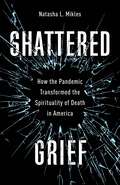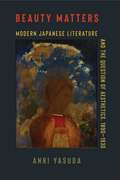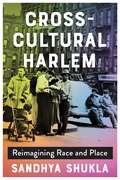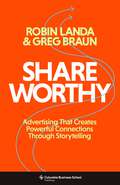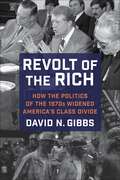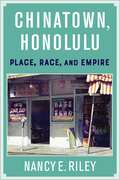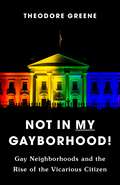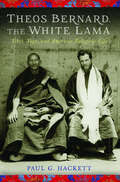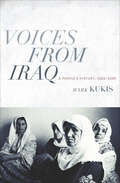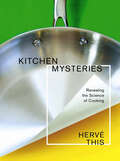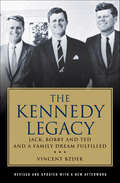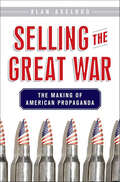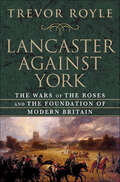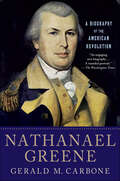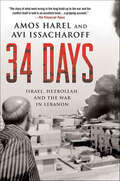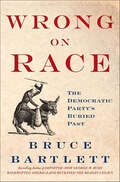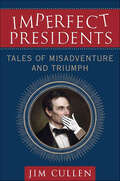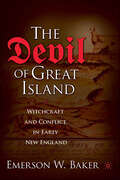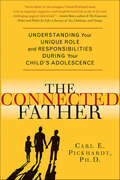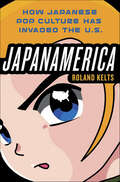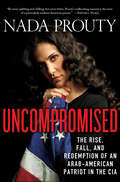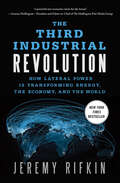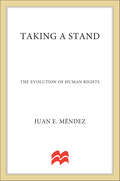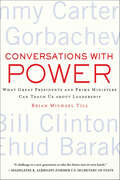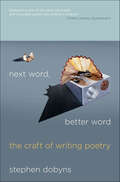- Table View
- List View
Shattered Grief: How the Pandemic Transformed the Spirituality of Death in America
by Natasha L. MiklesThe COVID-19 pandemic left millions grieving their loved ones without the consolation of traditional ways of mourning. Patients were admitted to hospitals and never seen again. Social distancing often meant conventional funerals could not be held. Religious communities of all kinds were disrupted at the exact moment mourners turned to them for support. These unprecedented circumstances caused dramatic transformations of not only communal rituals but also how people make meaning after the losses of loved ones.Shattered Grief is an intimate portrait of how COVID-19 changed the ways Americans approach, understand, and mourn death. Based on extensive interviews incorporating a multitude of perspectives—including funerary and medical professionals, religious leaders, grief counselors, death doulas, spirit mediums, community organizers, and those who lost loved ones—it provides a snapshot of how people renegotiated spiritual and religious traditions, worldviews, identities, and communities during the deadliest pandemic in a century. Through these diverse and powerful voices, Natasha L. Mikles tells the story of spiritual innovation, religious change, and the struggle to achieve personal and national self-understanding against the backdrop of mass casualties. Compelling and accessible, Shattered Grief is an essential book for a range of readers interested in how we make sense of death and dying.
Beauty Matters: Modern Japanese Literature and the Question of Aesthetics, 1890–1930 (Studies of the Weatherhead East Asian Institute, Columbia University)
by Anri YasudaThe notion of beauty is inherently elusive: aesthetic judgments are at once subjective and felt to be universally valid. In Beauty Matters, Anri Yasuda demonstrates that by exploring the often conflicting yet powerful pull of aesthetic sentiments, major authors of the late Meiji (1868–1912) and Taishō (1912–1926) periods illuminated themes and perspectives that resonated broadly in modern Japanese society. This approach presents an alternative to conventional accounts in which Japanese literature before the modernist turn of the 1920s has tended to be defined by an insular focus on subjective representation and autobiographical realism.Yasuda investigates how Natsume Sōseki, Mori Ogai, Mushanokōji Saneatsu and his peers at Shirakaba magazine, and Akutagawa Ryūnosuke sought to identify the aesthetic properties of literature through comparisons with the visual arts. They also considered the position of Japanese cultural sensibilities within the Eurocentric imperial world order. Their stories featuring painters and paintings weigh the fundamental challenge of representing anything when the conditions of knowledge are in flux, and their stories about cross-cultural encounters display both hope and ambivalence about the prospect of cosmopolitanism. Yasuda shows how thinking about beauty and art enabled these authors to surpass purely “literary” concerns. By tracing the wide-reaching significance of aesthetic affect in literary thought, Beauty Matters destabilizes received conceptions of literature’s parameters and affirms literature’s continued potential to intervene in cultural discourses in Japan and beyond.
Cross-Cultural Harlem: Reimagining Race and Place
by Sandhya ShuklaOver the course of the twentieth and twenty-first centuries, Harlem has been the capital of both Black America and a global African diaspora, an early home for Italian and Jewish immigrant communities, an important Puerto Rican neighborhood, and a representative site of gentrification. How do we understand the power of a place with so many claims and identifications? Drawing on fiction, sociology, political speech, autobiography, and performance, Sandhya Shukla develops a living theory of Harlem, in which peoples of different backgrounds collide, interact, and borrow from each other, even while Blackness remains crucial.Cross-Cultural Harlem reveals a dynamic of exchange that provokes a rethinking of spaces such as Black Harlem, El Barrio, and Italian Harlem. Cross-cultural encounters among African Americans, West Indians, Puerto Ricans, Jews, and Italians provide a story of multiplicity that challenges the framework of territorial enclaves. Shukla illuminates the historical processes that have shaped the diversity of Harlem, examining the many dimensions of its Blackness—Southern, African, Caribbean, Puerto Rican, and more—as well as how white ethnicities have been constructed. Considering literary and historical examples such as Langston Hughes’s short story “Spanish Blood,” the career of the Italian American left-wing Harlem congressman Vito Marcantonio, and the autobiography of Puerto Rican–Cuban writer Piri Thomas, Shukla argues that cosmopolitanism and racial belonging need not be seen as contradictory. Cross-Cultural Harlem offers a vision of sustained dialogue to respond to the challenges of urban transformations and to affirm the future of Harlem as actual place and global symbol.
Shareworthy: Advertising That Creates Powerful Connections Through Storytelling
by Robin Landa Greg BraunIn today’s highly competitive marketplace, a brand must tell meaningful stories that resonate with their target audiences across media channels. People want more than a utilitarian benefit—stories are ultimately what drive us to engage with brands. And we want to align ourselves with brands that are ethical and purpose-driven and that take responsibility for their actions and messaging.This indispensable book reveals what makes brand stories “shareworthy” and guides readers through creating relevant and resonant advertising. Combining practitioner and academic perspectives, Robin Landa and Greg Braun offer a roadmap for conceiving and developing creative advertising campaigns that are responsible and inclusive—and that audiences enthusiastically share. They demonstrate that shareworthy storytelling embraces diversity, equity, inclusion, purpose, and brand activism and eschews tropes, stereotypes, and negative messaging. The book features candid interviews with expert practitioners spanning diverse global communities who share the hard-earned wisdom of their award-winning campaigns, as well as insightful case studies from major companies such as Amazon, Nike, the New York Times, and Dove. Timely and actionable, Shareworthy shows current and aspiring marketing professionals how to craft a story, connect with the audience, and embrace social responsibility throughout.
Revolt of the Rich: How the Politics of the 1970s Widened America's Class Divide
by David GibbsInequality in the United States has reached staggering proportions, with a massive share of wealth held by the very richest. How was such a dramatic shift in favor of a narrow elite possible in a democratic society? David N. Gibbs explores the forces that shaped the turn toward free market economics and wealth concentration and finds their roots in the 1970s. He argues that the political transformations of this period resulted from a “revolt of the rich,” whose defense of their class interests came at the expense of the American public.Drawing on extensive archival research, Gibbs examines how elites established broad coalitions that brought together business conservatives, social traditionalists, and militarists. At the very top, Richard Nixon’s administration quietly urged corporate executives to fund conservative think tanks and seeded federal agencies with free-market economists. Even Jimmy Carter’s ostensibly liberal administration brought deregulation to the financial sector along with the imposition of severe austerity measures that hurt the living standards of the working class. Through a potent influence campaign, academics and intellectuals sold laissez-faire to policy makers and the public, justifying choices to deregulate industry, cut social spending, curb organized labor, and offshore jobs, alongside expanding military interventions overseas.Shedding new light on the political alliances and policy decisions that tilted the playing field toward the ultrawealthy, Revolt of the Rich unveils the origins of today’s stark disparities.
Chinatown, Honolulu: Place, Race, and Empire
by Nancy E. RileyThe Chinese experience in Hawai‘i has long been told as a story of inclusion and success. During the Cold War, the United States touted the Chinese community in Hawai‘i as an example of racial harmony and American opportunity, claiming that all ethnic groups had the possibility to attain middle-class lives. Today, Honolulu’s Chinatown is not only a destination for tourism and consumption but also a celebration of Chinese accomplishments, memorializing past discrimination and present prominence within a framework of multiculturalism. This narrative, however, conceals many other histories and processes that played crucial roles in shaping Chinatown.This book offers a critical account of the history of Chinese in Hawai‘i from the mid-nineteenth century to the present in this context of U.S. empire, settler colonialism, and racialization. Nancy E. Riley foregrounds elements that are often left out of narratives of Chinese history in Hawai‘i, particularly the place of Native Hawaiians, geopolitics and U.S. empire building, and the ongoing construction of race and whiteness. Tracing how Chinatown became a site of historical remembrance, she argues that it is also used to reinforce the ideology of neoliberal multiculturalism, which upholds racial hierarchy by lauding certain ethnic groups while excluding others. An insightful and in-depth analysis of the story of Honolulu’s Chinatown, this book offers new perspectives on the making of the racial landscape of Hawai‘i and the United States more broadly.
Not in My Gayborhood: Gay Neighborhoods and the Rise of the Vicarious Citizen
by Theodore GreeneGay neighborhoods are disappearing—or so the conventional story goes. In this narrative, political gains and mainstream social acceptance, combined with the popularity of dating apps like Grindr, have reduced the need for LGBTQ+ people to seek refuges or build expressly queer places. Yet even though residential patterns have shifted, traditionally gay neighborhoods remain centers of queer public life.Exploring “gayborhoods” in Washington, DC, Theodore Greene investigates how neighborhoods retain their cultural identities even as their inhabitants change. He argues that the success and survival of gay neighborhoods have always depended on participation from nonresidents in the life of the community, which he terms “vicarious citizenship.” Vicarious citizens are diverse self-identified community members, sometimes former or displaced locals, who make symbolic claims to the neighborhood. They defend their vision of community by temporarily reviving the traditions and cultures associated with the gay neighborhood and challenging the presence of straight families and other newcomers, the displacement of local institutions, or the taming of sexual culture. Greene pays careful attention to the significance of race and racism, highlighting the important role of Black LGBTQ+ culture in shaping gay neighborhoods past and present. Examining the diverse placemaking strategies that queer people deploy to foster and preserve LGBTQ+ geographies, Not in My Gayborhood illuminates different ways of imagining urban neighborhoods and communities.
Theos Bernard, the White Lama: Tibet, Yoga, and American Religious Life
by Paul G. HackettThe life and adventures of an American explorer and iconic figure in the 20th century religious counterculture movement.In 1937, Theos Casimir Bernard, the self-proclaimed &“White Lama,&” became the third American in history to reach Lhasa, the capital city of Tibet. During his stay, he amassed the largest collection of Tibetan texts, art, and artifacts in the Western hemisphere at that time. He also documented, in both still photography and 16mm film, the age-old civilization of Tibet on the eve of its destruction by Chinese Communists. Based on thousands of primary sources and rare archival materials, this is the real story behind the purported adventures of Bernard and his role in the growth of America's religious counterculture. Over the course of his brief life, Bernard met, associated, and corresponded with the major social, political, and cultural leaders of his day, from the Regent and high politicians of Tibet to saints, scholars, and diplomats of British India, from Charles Lindbergh and Franklin Delano Roosevelt to Gandhi and Nehru. Although hailed as a brilliant pioneer by the media, Bernard also had his flaws. He was an entrepreneur propelled by grandiose schemes, a handsome man who shamelessly used his looks to bounce from rich wife to rich wife in support of his activities, and a master manipulator who concocted his own interpretation of Eastern wisdom to suit his ends. Bernard had a bright future before him but disappeared in India during the communal violence of the 1947 Partition, never to be seen again.&“Well-written…A readable intellectual account of the life of an ambitious Tibetological pioneer.&”—Asian Ethnology
Voices from Iraq: A People's History, 2003–2009
by Mark KukisA Time magazine foreign correspondent shares &“moving stories from the Iraqis who lived through the nightmare&” in this oral history of the Iraq War (Kikrus). Journalist Mark Kukis presents a history of the U.S. invasion and occupation of Iraq as told by Iraqis who live through it.Beginning in 2003, this intimate narrative includes the accounts of civilians, politicians, former dissidents, insurgents, and militiamen. The men and women sharing their firsthand experiences range from onetime Prime Minister Ayad Allawi to resistance fighters speaking on the condition of anonymity. Divided into five parts, these interviews recount the 2003 invasion; the two years of chaos that followed; the start of a new order in 2006; the rise of sectarian violence; and the effort to reconstruct their society since 2008. In each section, interviews grouped into themes, with brief epilogues for the participants. As Studs Terkel's The Good War did for World War II, Voices from Iraq brings the meaning and legacy of America's campaign in Iraq to vivid life.
Kitchen Mysteries: Revealing the Science of Cooking (Arts and Traditions of the Table Perspectives on Culinary History)
by Hervé This&“This&’s molecular gastronomy is garnished with [his] own rich philosophy of food and flavor&” in a book that reveals the science behind everyday cooking (Nature). In Kitchen Mysteries, Hervé This—international celebrity and founder of molecular gastronomy—offers a second helping of his world-renowned insight into the science of cooking, answering such fundamental questions as what causes vegetables to change color when cooked and how to keep a soufflé from falling. He illuminates abstract concepts with practical advice and concrete examples—for instance, how sautéing in butter chemically alters the molecules of mushrooms—so that cooks of every stripe can thoroughly comprehend the scientific principles of food. By sharing the empirical principles chefs have valued for generations, Hervé This adds another dimension to the suggestions of cookbook authors. He shows how to adapt recipes to available ingredients and how to modify proposed methods to the utensils at hand. His revelations make difficult recipes easier to attempt and allow for even more creativity and experimentation. Promising to answer your most compelling kitchen questions, Hervé This continues to make the complex science of food digestible to the cook. &“Cooks who want to learn more about the chemistry and physics that make their efforts possible will discover useful things here.&”—Booklist &“This has made invisible processes visible, revealed the mysteries, and the bread has risen, baked, and been enjoyed.&”—Appetite for Books &“[An] eye-opening book.&”—Portsmouth Herald &“Kitchen Mysteries is another tour de force for the French scientific chef . . . Highly Recommended.&”—Choice
The Kennedy Legacy: Jack, Bobby and Ted and a Family Dream Fulfilled
by Vincent BzdekJohn, Robert, and Ted Kennedy's individual stories can be seen as essentially one, each successive brother striving to fulfill the interrupted promise of the brother before. The closing of Ted Kennedy's chapter in America's political and cultural life means that, for the first time perhaps, the real measure of the Kennedy legacy can finally be taken. This is a story of a brotherhood in three acts: Act I is John F. Kennedy's presidency, as seen from Ted's front-row seat. Act II is Robert Kennedy's five brief years as the family standard bearer, including his tenure in the Senate with his brother Ted and the memorable 82-day presidential campaign that redefined the Kennedy legacy. Act III is Ted's 40-plus years in the Senate as keeper of the flame.How did the brothers pass the torch to each other? What have the three brothers left us collectively? And who carries the torch forward now? The Kennedy Legacy compellingly answers these questions and much more.
Selling the Great War: The Making of American Propaganda
by Alan AxelrodThe riveting, untold story of George Creel and the Committee on Public Information -- the first and only propaganda initiative sanctioned by the U.S. government.When the people of the United States were reluctant to enter World War I, maverick journalist George Creel created a committee at President Woodrow Wilson's request to sway the tide of public opinion. The Committee on Public Information monopolized every medium and avenue of communication with the goal of creating a nation of enthusiastic warriors for democracy. Forging a path that would later be studied and retread by such characters as Adolf Hitler, the Committee revolutionized the techniques of governmental persuasion, changing the course of history. Selling the War is the story of George Creel and the epoch-making agency he built and led. It will tell how he came to build the and how he ran it, using the emerging industries of mass advertising and public relations to convince isolationist Americans to go to war. It was a force whose effects were felt throughout the twentieth century and continue to be felt, perhaps even more strongly, today. In this compelling and original account, Alan Axelrod offers a fascinating portrait of America on the cusp of becoming a world power and how its first and most extensive propaganda machine attained unprecedented results.
Lancaster Against York: The Wars of the Roses and the Foundation of Modern Britain
by Trevor RoyleIn this sweeping history, Trevor Royle details one of the bloodiest episodes in British history. The prize was the crown of England, and the players were the rival houses of Lancaster and York. The dynastic quarrel threatened the collapse of the monarchy as a succession of weak rulers failed to deal with an overzealous aristocracy, plunging England into a series of violent encounters. The bloody battles and political intrigue between the rival heirs of King Edward III brought forth one of the most dynamic ruling families of England--the Tudors.
Nathanael Greene: A Biography of the American Revolution
by Gerald M. CarboneThe intriguing life story of an unsung hero of the American Revolution from award-winning author Gerald M. Carbone. When the Revolutionary War began, Nathanael Greene was a private in the militia, the lowest rank possible, yet he emerged from the war with a reputation as George Washington's most gifted and dependable officer--celebrated as one of three most important generals. Upon taking command of America's Southern Army in 1780, Nathanael Greene was handed troops that consisted of 1,500 starving, nearly naked men. Gerald Carbone explains how within a year, the small worn-out army ran the British troops out of Georgia, South Carolina, and North Carolina and into the final trap at Yorktown. Despite his huge military successes and tactical genius Greene's story has a dark side. Gerald Carbone drew on 25 years of reporting and researching experience to create his chronicle of Greene's unlikely rise to success and his fall into debt and anonymity.
34 Days: Israel, Hezbollah, and the War in Lebanon
by Amos Harel Avi IssacharoffThis is the first comprehensive account of the progression of the Second Lebanese War, from the border abduction of an Israeli soldier on the morning of July 12, 2006, through the hasty decision for an aggressive response; the fateful discussions in the Cabinet and the senior Israeli command; to the heavy fighting in south Lebanon and the raging diplomatic battles in Paris, Washington and New York. The book answers the following questions: has Israel learned the right lessons from this failed military confrontation? What can Western countries learn from the IDF's failure against a fundamentalist Islamic terror organization? And what role did Iran and Syria play in this affair?34 Days delivers the first blow-by-blow account of the Lebanon war and new insights for the future of the region and its effects on the West.
Wrong on Race: The Democratic Party's Buried Past
by Bruce BartlettIn Wrong on Race, Bruce Bartlett sets the record straight on a hidden past that many Democrats would rather see swept under the carpet. Ranging from the founding of the Republic through to today, it rectifies the unfair perceptions of America's two national parties. While Nixon's infamous "Southern Strategy" is constantly referenced in the media, less well remembered are Woodrow Wilson's segregation of the entire Federal civil service; FDR's appointment of a member of the KKK to the Supreme Court; John F. Kennedy's apathy towards civil rights legislation; and the ascension of Robert Byrd, who is current President pro tempore of the Senate, third in line in the presidential line of succession, and a former member of the KKK. For the last seventy years, African Americans have voted en masse for one party, with little in the end to show for it. Is it time for the pendulum to swing the other way? With the Republican Party furiously engaged in pre-2008 soul searching, this exhaustively researched, incisively written exposé will be an important and compelling component of that debate as we head towards November.
Imperfect Presidents: Tales of Misadventure and Triumph
by Jim CullenWhen people make bad decisions, odd remarks, and just plain silly mistakes, the results are sure to haunt them. But when these things happen to the president of the United States, they can change the course of history. In this clever portrait of the American presidency, Jim Cullen takes ten presidents down from their pedestals by examining key missteps in their careers--and how they transcended them. Examples include Abraham Lincoln smearing a preacher and rediscovering his religious vision in emancipating slaves; Lyndon Johnson's electoral fraud in his 1948 Senate race and his role in the signing of the Voting Rights Act; and Ronald Reagan's subversion of the Constitution in the Iran-Contra affair and affirmation of world peace in helping bring about the end of the Cold War. Targeting Republicans and Democrats alike, Cullen's insights are surprisingly timely and hugely entertaining.
The Devil of Great Island: Witchcraft and Conflict in Early New England
by Emerson W. BakerIn 1682, ten years before the infamous Salem witch trials, the town of Great Island, New Hampshire, was plagued by mysterious events: strange, demonic noises; unexplainable movement of objects; and hundreds of stones that rained upon a local tavern and appeared at random inside its walls. Town residents blamed what they called "Lithobolia" or "the stone-throwing devil." In this lively account, Emerson Baker shows how witchcraft hysteria overtook one town and spawned copycat incidents elsewhere in New England, prefiguring the horrors of Salem. In the process, he illuminates a cross-section of colonial society and overturns many popular assumptions about witchcraft in the seventeenth century.
The Connected Father: Understanding Your Unique Role and Responsibilities During Your Child's Adolescence
by Carl E. PickhardtParenting Expert Carl Pickhardt Shows How the Bonds Between Fathers and Teens Can Be StrengthenedMany fathers feel unprepared for their child's adolescence, in their denial, often times preferring to believe that it will only happen to other people's children. In this sensitive and forthright book, Carl Pickhardt stresses that fathers need to become informed about changes and challenges that normally unfold. Helping caring fathers navigate the four crucial and often perplexing stages of adolescence, The Connected Father describes: * how fathers can learn to be better listeners * why they have trouble communicating and what to do about it* different emotional changes between mid- and late-adolescence* how to encourage independence while setting limits* how fathers can talk to teens about drugs, sex, the internet, relationships, and more
Japanamerica: How Japanese Pop Culture Has Invaded the U.S.
by Roland KeltsContemporary Japanese pop culture such as anime and manga (Japanese animation and comic books) is Asia's equivalent of the Harry Potter phenomenon--an overseas export that has taken America by storm. While Hollywood struggles to fill seats, Japanese anime releases are increasingly outpacing American movies in number and, more importantly, in the devotion they inspire in their fans. But just as Harry Potter is both "universal" and very English, anime is also deeply Japanese, making its popularity in the United States totally unexpected. Japanamerica is the first book that directly addresses the American experience with the Japanese pop phenomenon, covering everything from Hayao Miyazaki's epics, the burgeoning world of hentai, or violent pornographic anime, and Puffy Amiyumi, whose exploits are broadcast daily on the Cartoon Network, to literary novelist Haruki Murakami, and more. With insights from the artists, critics, readers and fans from both nations, this book is as literate as it is hip, highlighting the shared conflicts as American and Japanese pop cultures dramatically collide in the here and now.
Uncompromised: The Rise, Fall, and Redemption of an Arab-American Patriot in the CIA
by Nada Prouty"Nada Prouty served her country loyally, with distinction, and, as universally acknowledged by her colleagues, with great personal courage as a CIA covert officer. This tale of rampant trampling of citizen's rights is a vivid reminder of the responsibility of citizens to be vigilant against unaccountable government overreach if we hope to keep a strong democracy, where the rule of law prevails and where a citizen is presumed innocent until proven guilty." -Valerie Plame, author of Fair GameWhen Nada Prouty came to the United States as a young woman, she fell in love with the democracy and freedom of her new home. After a childhood in war-torn Lebanon with an abusive father and facing the prospect of an arranged marriage, she jumped at the chance to forge her own path in America-a path that led to exciting undercover work in the FBI, then the CIA. As a leading agent widely lauded by her colleagues, she worked on the most high-profile terrorism cases in recent history, including the hunt for Saddam Hussein and the bombing of the USS Cole, often putting her life on the line and usually getting her man.But all this changed in the wake of 9/11, at the height of anti-Arab fervor, when federal investigators charged Prouty with passing intelligence to Hezbollah. Lacking sufficient evidence to make their case in court, prosecutors went to the media, suggesting that she had committed treason. Prouty, dubbed "Jihad Jane" by the New York Post, was quickly cast as a terrorist mastermind by the relentless 24-hour news cycle, and a scandal-hungry public ate it up.Though the CIA and federal judge eventually exonerated Prouty of all charges, she was dismissed from the agency and stripped of her citizenship. In Uncompromised, Prouty tells her whole story in a bid to restore her name and reputation in the country that she loves. Beyond a thrilling story of espionage and betrayal, this is a sobering commentary on cultural alienation, the power of fear, and what it means to truly love America.
The Third Industrial Revolution: How Lateral Power Is Transforming Energy, the Economy, and the World
by Jeremy RifkinThe Industrial Revolution, powered by oil and other fossil fuels, is spiraling into a dangerous endgame. The price of gas and food are climbing, unemployment remains high, the housing market has tanked, consumer and government debt is soaring, and the recovery is slowing. Facing the prospect of a second collapse of the global economy, humanity is desperate for a sustainable economic game plan to take us into the future.Here, Jeremy Rifkin explores how Internet technology and renewable energy are merging to create a powerful "Third Industrial Revolution." He asks us to imagine hundreds of millions of people producing their own green energy in their homes, offices, and factories, and sharing it with each other in an "energy internet," just like we now create and share information online.Rifkin describes how the five-pillars of the Third Industrial Revolution will create thousands of businesses, millions of jobs, and usher in a fundamental reordering of human relationships, from hierarchical to lateral power, that will impact the way we conduct commerce, govern society, educate our children, and engage in civic life.Rifkin's vision is already gaining traction in the international community. The European Union Parliament has issued a formal declaration calling for its implementation, and other nations in Asia, Africa, and the Americas, are quickly preparing their own initiatives for transitioning into the new economic paradigm.The Third Industrial Revolution is an insider's account of the next great economic era, including a look into the personalities and players — heads of state, global CEOs, social entrepreneurs, and NGOs — who are pioneering its implementation around the world.
Taking a Stand: The Evolution of Human Rights
by Juan E. MéndezJuan Méndez has experienced human rights abuse first hand. As a result of his work with political prisoners in the late 1970s, the Argentinean military dictatorship arrested, tortured, and held him for more than a year. During that time, Amnesty International adopted him as a "Prisoner of Conscience." After his release, he moved to the United States and continued his lifelong fight for the rights of others, and the lessons he has gleaned over the decades can help us with our current struggles. Here, he sets forth an authoritative and incisive examination of torture, detention, exile, armed conflict, and genocide, whose urgency is even greater in the wake of America's recent disastrous policies. Méndez offers a new strategy for holding governments accountable for their actions, providing an essential blueprint for different human rights groups to be able to work together to effect change.
Conversations with Power: What Great Presidents and Prime Ministers Can Teach Us about Leadership
by Brian Michael TillFresh out of college, and frustrated with own generation's political apathy, Brian Till set out to interview the former world leaders he most admired. To his surprise, they were eager to talk, and he soon found himself discussing everything from energy to terrorism to nuclear disarmament with the greatest leaders of the last twenty-five years. Here, he distills what they learned in office, their predictions for the future, and their advice for the leaders of tomorrow. Including interviews with:*Bill Clinton*Gro Bruntland*Jimmy Carter*Fernando Henrique Cardoso*Ehud Barak*Vaclav Havel*Mikhail Gorbachev*Pervez Musharraf*F.W. de Klerk*Ricardo Lagos*Helmut Schmidt*Goh Chok Tong*Paul Keating
Next Word, Better Word: The Craft of Writing Poetry
by Stephen DobynsThis accessible writer's guide provides a helpful framework for creating poetry and navigates contemporary concerns and practices. Stephen Dobyns, author of the classic book on the beauty of poetry, Best Words, Best Order, moves into new terrain in this remarkable book. Bringing years of experience to bear on issues such as subject matter, the mechanics of poetry, and the revision process, Dobyns explores the complex relationship between writers and their work. From Philip Larkin to Pablo Neruda to William Butler Yeats, every chapter reveals useful lessons in these renowned poets' work. Both enlightening and encouraging, Next Word, Better Word demystifies a subtle art form and shows writers how to overcome obstacles in the creative process.
